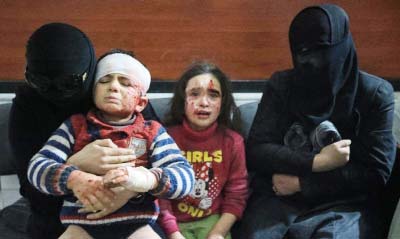
AFP, Douma :
The Syrian army continued its offensive against rebel-held Eastern Ghouta Saturday, a day after an aid convoy delivered food to the hunger-stricken residents of the enclave despite heavy bombardment.
Nearly 950 civilians have been killed since Russia-backed government forces launched a blistering assault on the last opposition bastion near Damascus on February 18.
Eastern Ghouta’s 400,000 inhabitants have lived under government siege since 2013 and the enclave-more than half of which has over the past three weeks been retaken by regime forces-is home to a myriad of armed groups.
Apart from Islamist groups such as Jaish al-Islam, jihadists from Hayat Tahrir al-Sham (HTS), who are mostly linked to Al-Qaeda, are also deployed there.
Syrian state television aired footage of a single bus carrying 13 “fighters” and family members out of the enclave through Al-Wafideen checkpoint, without giving their affiliation.
Some appeared to be young, while others wore hoodies to cover their heads and faces.
The limited operation came as the powerful Jaish al-Islam said HTS fighters would be evacuated to the northern province of Idlib, in an arrangement struck following consultations with the United Nations and other international players.
“It has been agreed that the first group of HTS members be released from the prisons of Jaish al-Islam … (and) moved to Idlib at their request,” Jaish al-Islam said.
HTS is the main force in Idlib, in Syria’s northwest and the last province outside regime control.
Civilians continued to bear the brunt of the violence on Friday with at least six killed in air strikes on the area of Jisreen, the Syrian Observatory for Human Rights war monitor said.
Thirteen trucks loaded with 2,400 food parcels, meanwhile, crossed into Eastern Ghouta, the International Committee of the Red Cross said, entering what UN chief Antonio Guterres has called “hell on earth”.
But “shelling” near the enclave’s main town of Douma threatened “to put at risk” the joint ICRC, Syrian Arab Red Crescent and United Nations convoy, said the UN humanitarian coordinator in Syria, Ali al-Zaatari.
The aid was delivered as helicopters hovered overhead and warplanes targeted areas outside Douma, a correspondent said.
The World Health Organization said it has verified 67 hits on medical facilities in Syria through January and February, nearly half of them in Eastern Ghouta.
The facilities hit included 20 hospitals, 16 health facilities, two ambulance stations and one medical supply warehouse.
Doctors and nurses in the enclave have run out of several life-saving items, according to Doctors Without Borders (MSF), which reported a “terrible medical catastrophe.”
“Medical material is extremely limited, medical infrastructure has been hit and medical staff are exhausted,” it said, adding that hundreds of people have been wounded and need urgent assistance.
In the face of the regime’s Russian-backed onslaught, Ghouta’s main rebel groups had so far rejected Moscow-brokered offers to evacuate civilians or any of their own fighters.
The Syrian army continued its offensive against rebel-held Eastern Ghouta Saturday, a day after an aid convoy delivered food to the hunger-stricken residents of the enclave despite heavy bombardment.
Nearly 950 civilians have been killed since Russia-backed government forces launched a blistering assault on the last opposition bastion near Damascus on February 18.
Eastern Ghouta’s 400,000 inhabitants have lived under government siege since 2013 and the enclave-more than half of which has over the past three weeks been retaken by regime forces-is home to a myriad of armed groups.
Apart from Islamist groups such as Jaish al-Islam, jihadists from Hayat Tahrir al-Sham (HTS), who are mostly linked to Al-Qaeda, are also deployed there.
Syrian state television aired footage of a single bus carrying 13 “fighters” and family members out of the enclave through Al-Wafideen checkpoint, without giving their affiliation.
Some appeared to be young, while others wore hoodies to cover their heads and faces.
The limited operation came as the powerful Jaish al-Islam said HTS fighters would be evacuated to the northern province of Idlib, in an arrangement struck following consultations with the United Nations and other international players.
“It has been agreed that the first group of HTS members be released from the prisons of Jaish al-Islam … (and) moved to Idlib at their request,” Jaish al-Islam said.
HTS is the main force in Idlib, in Syria’s northwest and the last province outside regime control.
Civilians continued to bear the brunt of the violence on Friday with at least six killed in air strikes on the area of Jisreen, the Syrian Observatory for Human Rights war monitor said.
Thirteen trucks loaded with 2,400 food parcels, meanwhile, crossed into Eastern Ghouta, the International Committee of the Red Cross said, entering what UN chief Antonio Guterres has called “hell on earth”.
But “shelling” near the enclave’s main town of Douma threatened “to put at risk” the joint ICRC, Syrian Arab Red Crescent and United Nations convoy, said the UN humanitarian coordinator in Syria, Ali al-Zaatari.
The aid was delivered as helicopters hovered overhead and warplanes targeted areas outside Douma, a correspondent said.
The World Health Organization said it has verified 67 hits on medical facilities in Syria through January and February, nearly half of them in Eastern Ghouta.
The facilities hit included 20 hospitals, 16 health facilities, two ambulance stations and one medical supply warehouse.
Doctors and nurses in the enclave have run out of several life-saving items, according to Doctors Without Borders (MSF), which reported a “terrible medical catastrophe.”
“Medical material is extremely limited, medical infrastructure has been hit and medical staff are exhausted,” it said, adding that hundreds of people have been wounded and need urgent assistance.
In the face of the regime’s Russian-backed onslaught, Ghouta’s main rebel groups had so far rejected Moscow-brokered offers to evacuate civilians or any of their own fighters.

